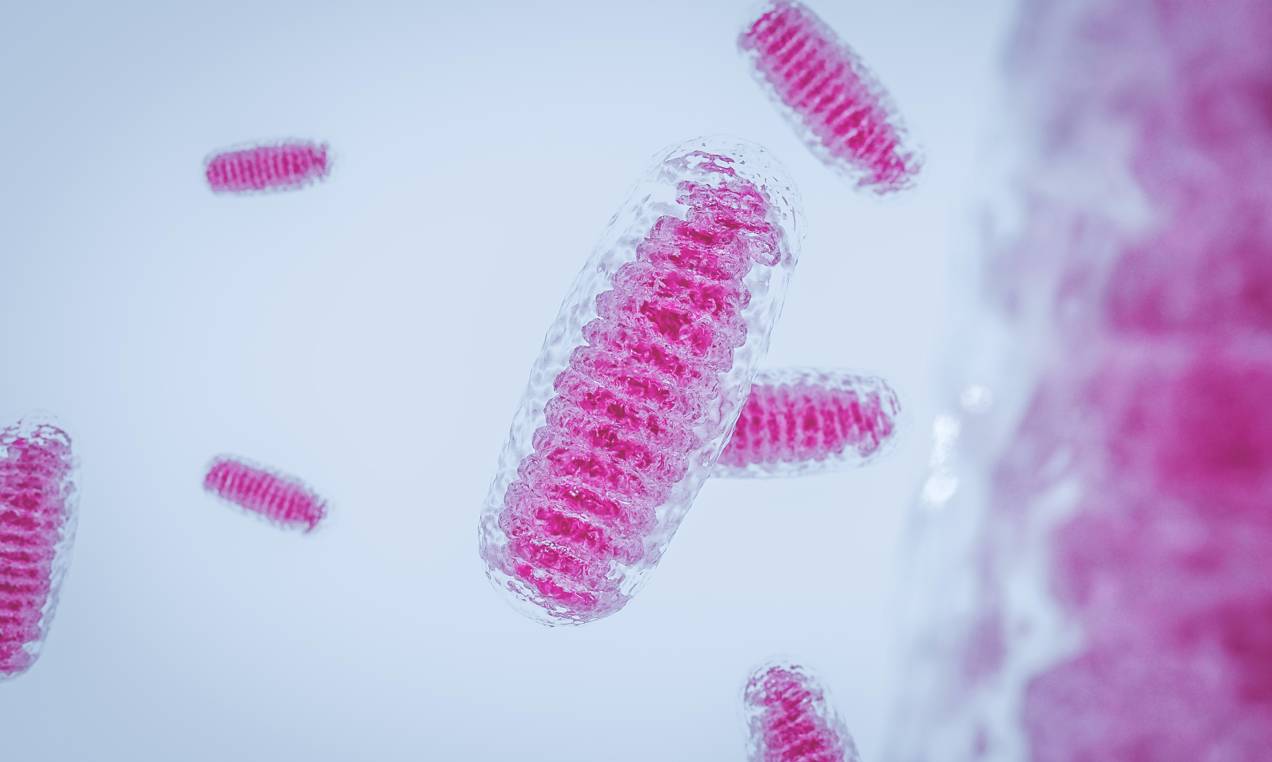
When pursuing a healthy lifestyle, we often focus on dietary habits and physical activity, recognizing their impact on our overall well-being. However, a crucial element often goes unnoticed: cellular health and energy efficiency.
The human body is composed of trillions of cells that provide structure for the body, converting nutrients into energy and carrying out specialized functions. Inflammation from the activities of your gut microbiome and oral microbiome can be problematic for your cells.
Nourishing your body from the inside out: understanding cellular health
Your nutrition is an essential factor in cellular repair and support processes. When cells lack the nutrition they need, they can't keep up with the body's metabolic demands, which leads to a loss of function and is the earliest measurable indicator of aging and health decline.
When cells function optimally, they produce enough energy to sustain your needs and efficiently " clean up” cellular waste, like free radicals.
You can improve cellular health through nutrition and supplements. The food and nutrients you put into your body can affect the cells’ ability to replicate appropriately and to make the bodily tissues you need to repair daily damage, build new muscle, and reduce the effects of aging. What you eat directly informs your cells' health and your vitality.
Benefits of optimal cellular nutrition
Cellular health means cells function optimally, producing energy, cleaning waste, and keeping systems running. Your body comprises millions of cells working together. Each cell has parts like a membrane, components transferring messages, making energy, detoxifying, and more. All parts must work well for ideal health. This requires proper nutrients and less daily stress.
When our cells are well-nourished, we experience a range of health benefits, including:
Enhanced energy levels: Well-functioning cells produce energy efficiently, increasing physical and mental stamina.
Improved metabolism: Cellular nutrition supports efficient nutrient absorption and utilization, aiding in weight management and overall body composition.
Strengthened immune system: A healthy cellular environment promotes a robust immune system, better defending against health risks.
Reduced risk of chronic diseases: Optimal cellular function helps protect against chronic diseases such as heart disease, cancer, and diabetes.
True cellular health requires a personalized, individualized approach that further considers the health of microbial cells. Also known as microorganisms, microbial cells can account for various types of microscopic living organisms, including bacteria, archaea, prokaryotes, fungi, and even viruses. Microbiome testing is a great way to understand how microbial byproducts affect our human cells.
Essential foods for cellular health & energy efficiency
Cellular nutrition goes beyond simply providing our bodies with essential vitamins and minerals. It delves into the intricate processes within our cells, ensuring they have the resources they need to generate energy, repair damage, and carry out their specialized functions. When our cells are well-nourished, they perform at their peak, contributing to our overall health and vitality.
Our bodies require a variety of essential nutrients to maintain healthy cells. These include:
Minerals:
Minerals play crucial roles in various cellular processes, from energy production to structural support. Examples include magnesium, calcium, and potassium.Amino acids:
Amino acids are the building blocks of proteins, which are essential for tissue repair, enzyme production, and cell signaling.Fatty acids:
Fatty acids provide energy and are structural components of cell membranes. Healthy fats, such as avocados and nuts, are particularly beneficial.Vitamins:
Vitamins act as cofactors in numerous biochemical reactions within cells, supporting various cellular functions.
Our cells are very high-functioning machines, capable of healing and repairing old parts.
Cellular nutrition from nutrient-rich foods is key for healthy cell functioning and vibrant well-being.
Below are six foods known to nourish your cells:
What to eat: foods that promote cellular health and energy
Leafy greens
Leafy greens have nutrients that decrease inflammation and boost immunity. They tend to contain vitamin C, magnesium, folate, and vitamin A - all vital for immunity and health. Polyphenol antioxidants in greens are anti-inflammatory. Dark and vibrant leafy greens like spinach, kale, and Swiss chard are nutritional powerhouses for cellular health and have vitamins A, C, and K, and minerals like magnesium and iron to maintain healthy cells and aid tissue repair.
These nutrients are vital for maintaining healthy cells and promoting tissue repair. Additionally, leafy greens are rich in antioxidants and fiber. These compounds aid detoxification and support beneficial gut bacteria; their antioxidants, fiber, and nutrients help support detoxification and healthy gut bacteria.
Regularly consume these nutritious greens in salads, in smoothies, and at every chance. You provide your body with the critical compounds needed for cell rejuvenation.
Fatty Fish
Fatty fish like salmon have omega-3s that maintain cell membrane integrity and reduce inflammation. Omega-3s also support brain health and nerve cell regeneration. Regularly incorporating fish into your diet will also provide the critical protein for cell growth and repair.
Salmon contains omega-3 fatty acids. Research shows these fats may maintain vascular and heart health through anti-inflammatory effects. Consuming omega-3s in salmon can reduce triglycerides, blood pressure, clotting, and cardiac death risk. Eat 3 ounces of fatty fish, like salmon, twice weekly. Be sure to choose wild-caught salmon.
Not a fish lover? Fatty foods like avocados have omega-3s ideal for reducing inflammation and promoting brain function. Omega-3s also support heart health and cell membranes.
Nuts and seeds
Nuts and seeds are easy snacks and excellent sources of healthy fats, proteins, vitamins, minerals, and antioxidants like vitamin E and selenium. These support cell membranes, immunity, and tissue repair, protecting cells from free radical damage. Vitamin E is an antioxidant that protects cells from damage. It also improves protective immune cells.
There are many varieties to consider, almonds, brazil nuts, peanuts, walnuts, and even sunflower seeds. Nuts and seeds like walnuts also provide fatty acids, fiber, and minerals to regulate cholesterol, and support brain health, and build healthy cell membranes.
Nuts and seeds are also excellent sources of protein, which means they help support healthy cell growth. Add to your trail mix or snack on handfuls throughout the day. It is also helpful to soak nuts and seeds before eating to aid digestion.
Berries
Berries contain antioxidants fighting oxidative stress and inflammation, which damage cells. Their antioxidants also promote collagen for skin elasticity and wound healing. Berries provide vitamins and minerals like vitamin C for collagen synthesis and faster healing.
Berries like blueberries offer abundant antioxidants, combating free radicals and oxidative stress on cells. They also have fiber-supporting gut health. Blueberries provide fiber, vitamin C, and antioxidants, combating free radicals and disease. Add fresh or frozen berries to meals and smoothies.
Eggs
Eggs have historically been a low-cost, nutrient-dense whole food that is one of the best options for supporting cellular health. Eggs are nutrient-dense, with compounds affecting inflammation pathways in diseases. They have vitamins A, B12 and minerals for immunity and cellular health. Pasture-raised organic eggs are of higher quality.
Additionally, eggs contain several vitamins and minerals that play critical roles in immune system function and cellular health - including vitamins A and B12, zinc, iron, and selenium. However, the quality of eggs does make a difference. For the best nutrient profiles, sourcing eggs locally and choosing organic varieties from pasture-raised chickens allowed to forage naturally for their feed is ideal. There are infinite ways to add eggs to your diet: fried, scrambled on a sandwich, added to a salad, or a simple hard-boiled snack to take on the run.
Dark chocolate
Dark chocolate, when consumed in moderation, can provide multiple health benefits related to cellular health and regeneration. Dark chocolate contains powerful antioxidant compounds called flavonoids that may promote the repair of damaged cells and protect cells against oxidative stress and other sources of damage. These flavonoids also positively affect cardiovascular health by enhancing blood flow and supporting heart function.
The flavonoids in dark chocolate may also aid brain function. Choose varieties with a high cocoa content to obtain dark chocolate's maximal regenerative and protective effects. The higher the percentage of cocoa, the more flavonoids the chocolate will contain. The best-case scenario is to opt for dark chocolate with a cocoa content of at least 70%, though greater than 80% is ideal. This will provide abundant amounts of those flavonoids with antioxidant capacities, making dark chocolate a smart choice for supporting overall cellular health and function in multiple bodily systems.
What not to eat: foods that inhibit cellular health and energy
While certain foods can enhance cellular health, others can have detrimental effects. Sugary, fried, and processed foods promote inflammation and stress.
Below is a short list of the worst offenders. Limit your intake of these unfriendly foods to a minimum to protect your cells and support your overall well-being. It is best to avoid them completely.
Sugar:
Sugar, including those foods with excessive fructose, may increase oxidative damage and reduce stress resistance, shortening cell lifespan. Excessive sugar consumption can overwhelm cellular health, leading to inefficient energy production and the accumulation of harmful free radicals. Modifying sugar intake and choosing unprocessed, whole foods whenever possible is important. Removing sugar bolsters resistance and longevity.
Refined Grains:
Simple carbohydrates like white flour and rice quickly convert to glucose, damaging mitochondria and cellular health. Refined grains like white flour and white rice contain simple carbohydrates quickly converted to glucose in the body. This rapid spike in blood sugar strains the mitochondria, the powerhouses of the cells. Whole grains contain fiber, protein, and healthy fats that slow the conversion of carbohydrates into glucose. This provides a steady, sustained energy source that doesn't overwhelm the mitochondria.
Fried foods:
Fried foods contain trans fats that may alter cell membranes, disturbing nutrient flow and disrupting healthy communication between cells. Even though trans fats are largely banned, the process of frying foods can still generate these unhealthy fats. It's best to eliminate fried items, vegetable oils, and other sources of trans fats from your diet, as these fats promote chronic inflammation, which is tied to many diseases. By swapping out pro-inflammatory fried foods and oils for anti-inflammatory options like coconut and olive oils, you enable your body's cells to thrive and carry out the many duties that keep you healthy.
Processed Meats:
Highly processed meats have been shown to increase oxidative stress and inflammation levels in the body. This is likely due to the various chemical preservatives, flavorings, and other additives used in processing the meats. Additionally, high-temperature cooking methods like grilling and barbecuing can produce carcinogenic compounds that impact cellular health.
On the other hand, gently cooked or raw fresh meats that undergo minimal processing are not linked to the same increases in oxidation and inflammation. Opt for freshly prepared meats over pre-packaged processed meats to avoid unnecessary oxidative stress and inflammation that disrupt cellular homeostasis and function.
Pesticides and GMOs:
Pesticide residues that can be found on and in conventionally grown fruits, vegetables, and some animal products may cause significant mitochondrial damage at the cellular level. Mitochondria are responsible for critical cellular functions like energy production. Pesticides may disrupt regular mitochondrial activity, impairing overall health over time.
Avoid exposure to mitochondria-harming pesticides. It is best to choose organic, locally sourced produce whenever possible. Organic produce has not been treated with synthetic pesticides or fertilizers that damage mitochondria. Avoid GMO foods, as genetic modification could disrupt normal physiological functions in the body. Opt for spray-free, organic, and locally sourced produce whenever possible.
Your energy and your health depend on the health of your cells
Your cells are made of your food, and your body's health and energy quality depend on the nutrition you feed your body on a cellular level. Ideally, get your microbiome tested to discover precisely what your body needs on a cellular and microbial cellular level. In the meantime, explore an anti-inflammatory, antioxidant diet full of whole foods that nourishes cells for longevity.
By understanding the importance of cellular health and incorporating nutrient-rich foods into our diets, you allow your cells to function optimally, leading to improved health, vitality, and overall well-being. Remember, your cells are the foundation of our existence, and by nourishing them, you are nurturing our health and vitality.



